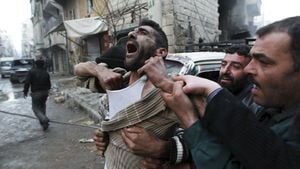On December 12, 2024, the Moscow military court handed down significant sentences to two captured Ukrainian soldiers, Vitalii Panchenko and Ivan Dmytrakov. Reports reveal Panchenko received 14 years, and Dmytrakov was sentenced to 15 years imprisonment. These convictions stem from charges of alleged terrorism, as the court accused them of firing at Russian troops and civilians, according to the state-owned TASS news agency.
This prosecution highlights the tensions surrounding the Kursk Oblast conflict, where both sides have faced pressures as Ukraine fights to maintain its foothold. The court asserted the two soldiers unlawfully crossed the border on August 7, 2024, indicating they are members of Ukraine's 61st Separate Mechanized Brigade. Amid this charged climate, claims have surfaced about the soldiers abducting three Russian citizens and looting grocery stores, particularly against the backdrop of Moscow's broad assertions about the conduct of Ukrainian forces.
Despite the charges, international observers have often denounced the Russian legal system for its pragmatic approach toward Ukrainian captives, noting allegations of torture faced by many during their detention. The latest event is among the first documented instances of sentences issued to Ukrainian service members for actions connected directly to operations taking place within Kursk Oblast.
Meanwhile, Russian occupation authorities have been acting decisively elsewhere. Reports revealed nine Ukrainian soldiers recently received sentences ranging from 21 years to life imprisonment for their roles during the defense of Mariupol, reflecting Moscow's relentless pursuit of alleged traitors among captured forces. While exchanges have allowed the release of some prisoners, many operate under harsh conditions until potential negotiations can be secured.
Simultaneously, tension has been rising as Russia intensifies its military focus on Kursk. Russian Defence Ministry stated they have retaken control of three villages: Daryino, Plyokhovo, and Novoivanovka, which make up part of the area previously occupied by Ukraine since August. Vitalii, one of the soldiers engaged at the front, conveyed chilling details from fellow troops, stating expectations for imminent Russian incursions aiming to reclaim lost ground before Donald Trump takes office as President of the United States.
Interestingly, soldiers facing pressure to hold course near Kursk remain firm, albeit with warnings from past Russian prisoners of war about Moscow's intentions. Observers speculate Russia may wish to regain the entire Kursk region to strengthen its position during any subsequent peace negotiations, as the political gears shift with Trump's influence on U.S.-Ukraine relations.
Engaged on the ground, Ukrainian soldiers describe morale as stable, stating they’ve received clear orders to maintain their positions even against reportedly overwhelming numbers of Russian forces, including troops from North Korea. The ground operations, nevertheless, have increasingly become arduous, as evidenced by comments surrounding territorial losses on the southeastern front, which were marked by heavy troop casualties on the part of Ukrainian units.
A soldier identified only as Bryn voiced concerns, noting continuous assaults where troops are actively losing ground and personnel. Emotional strains seem to permeate the ranks, eleviating fears among them about losing advantageous positions and the potential impact this could bear on their families if negotiations falter.
Contrastingly, Russian courts continue sternly implementing longstanding legal sanctions against perceived dissenters and collaborators. A case involving Sergei Chernooky, found guilty of treason for attempting to detonate explosives at Russian political offices, brought to light the extreme measures upheld by the Kremlin against those attempting to support Ukraine. Chernooky received 22 years, marking yet another stark example of punitive actions against individuals interfacing with Ukrainian military efforts.
With such heightened military and legal activities observed, the situation surrounding Kursk Oblast appears increasingly complex for all involved parties. The rapid verdicts and sentences paint a grim picture of conflict; both countries seem entrenched, with mutual distrust exacerbated by years of hostilities.



